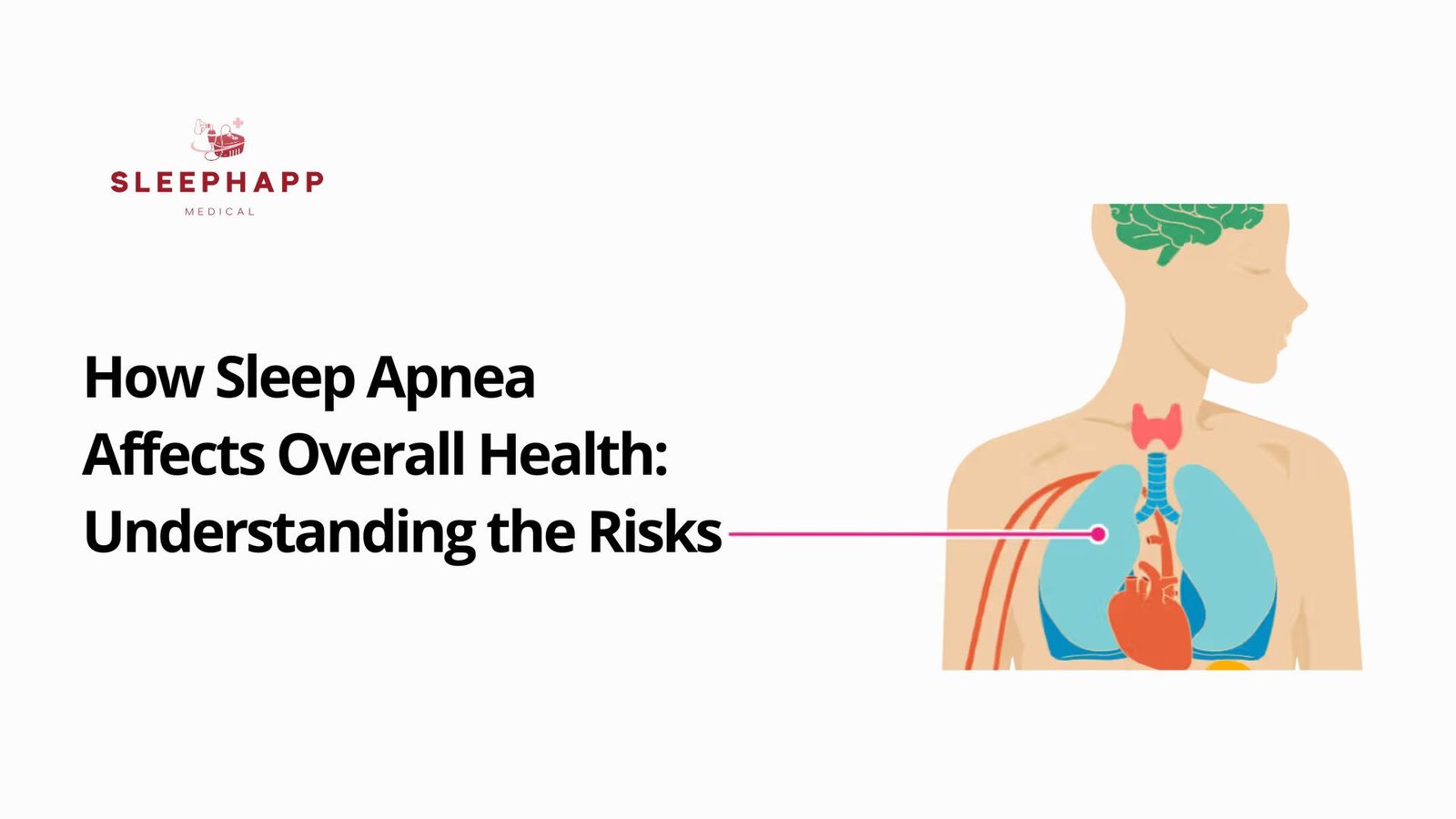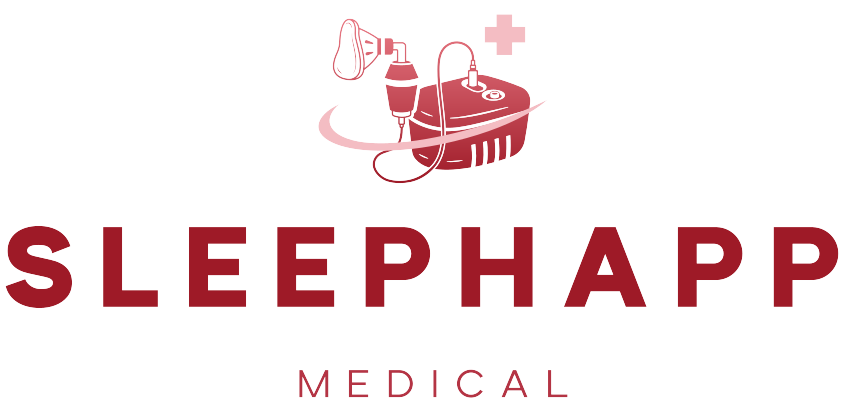How Sleep Apnea Affects Overall Health: Understanding the Risks
Home » How Sleep Apnea Affects Overall Health: Understanding the Risks

Table of Contents
You know exercise and eating healthy are good for your heart. But did you know sleep is just as important for heart health? Sleep apnea is a common problem. It makes breathing hard during sleep. Many people have it but don’t know.
Sleep apnea can harm your body in many ways. Sleep is very important for your body and mind. If sleep apnea isn’t treated, it can cause big health problems. This article explains the risks of sleep apnea and why early treatment matters.
What is Sleep Apnea?
Sleep apnea happens when the muscles in your upper airway relax during sleep. This blocks your airway and stops you from getting enough air. Your breathing may stop for 10 seconds or more. Then, your reflexes kick in, and you start breathing again. explains Jonathan Jun, M.D. , a pulmonary and sleep medicine specialist at the Johns Hopkins Sleep Disorders Center.
Types of Sleep Apnea:
Obstructive Sleep Apnea (OSA)
OSA is the most common sleep apnea. It happens when throat muscles relax too much during sleep, blocking airflow. This causes snoring, gasping, or choking as the body struggles to breathe. These pauses can happen many times each night. Poor sleep and low oxygen levels are common.
Risk Factors:
- Obesity
- Aging
- Smoking
- Family history
Symptoms:
- Loud snoring
- Gasping for air during sleep
- Daytime tiredness
- Morning headaches
- Trouble focusing
Central Sleep Apnea (CSA)
CSA happens when the brain does not signal the muscles to breathe. There is no throat blockage, but breathing pauses occur. CSA is less common than OSA and is often linked to health issues like heart failure, stroke, or brain injuries.
Symptoms:
- Stopping breathing during sleep
- Waking up short of breath
- Trouble staying asleep
- Fatigue and dizziness
- Trouble focusing
Complex/Mixed Sleep Apnea
This is a mix of OSA and CSA. It starts as OSA but also includes brain signal problems like CSA. Diagnosing and treating this type is harder because it has two causes of breathing pauses.
Symptoms:
- Loud snoring and breathing pauses
- Gasping or choking during sleep
- No muscle movement during pauses
- Daytime tiredness and trouble staying awake
The Risks of Untreated Sleep Apnea
Cardiovascular Health
- Sleep apnea harms the heart.
- It causes breathing to stop during sleep.
- These pauses lower oxygen and stress the heart.
- Untreated sleep apnea can cause high blood pressure and heart problems.
- It can also lead to strokes and damage to blood vessels.
Impact on Mental Health
- Sleep apnea disrupts sleep, hurting mental health.
- Not enough sleep causes anxiety and emotional struggles.
- People with sleep apnea often feel restless and uneasy.
- It is linked to depression by affecting brain chemicals.
- This can lead to sadness, tiredness, and trouble focusing.
Decreased Quality of Life
- Sleep apnea makes life harder.
- Tiredness affects daily tasks and productivity.
- Memory issues and poor focus hurt work or school performance.
- Mood swings can cause conflicts with loved ones.
Diagnosis and Treatment Options for Sleep Apnea
Treating sleep apnea is important. Untreated, it can harm your health over time. Some deaths, like Judge Antonin Scalia’s, highlight its dangers. But the main risk comes from ongoing damage.
Sleep apnea severity is measured by the apnea-hypopnea index (AHI). AHI counts how many times your breathing stops or slows each hour you sleep.
Sleep apnea levels:
- Severe: AHI over 30 (more than 30 episodes per hour).
- Moderate: AHI between 15 and 30.
- Mild: AHI between 5 and 15.
Treatment depends on severity, symptoms, and other health problems. For example:
- If you have heart disease risk, mild apnea may still need treatment.
- Severe apnea often needs treatment, even if you don’t feel sleepy.
The main treatment is a CPAP machine (Continuous Positive Airway Pressure). It blows humidified air through your nose. This air pressure keeps your throat open and prevents breathing pauses. Learn more about the risks and treatment of sleep apnea
Tips for Better Sleep and Preventing Sleep Apnea
Adopting healthy habits can reduce the risk of sleep apnea or make it less severe. Here are some easy tips to help you sleep better:
Stay at a Healthy Weight
Keep a healthy weight to reduce sleep apnea risk. Extra neck fat can block airways. Eat fruits, vegetables, and lean proteins. Exercise often to stay fit and improve sleep.
Set a Regular Sleep Schedule
Go to bed and wake up at the same time daily. Aim for 7-9 hours of sleep. A steady routine helps your body rest better.
Avoid Smoking and Alcohol
Smoking blocks airways, and alcohol relaxes throat muscles. Both worsen sleep apnea. Quit smoking and limit alcohol, especially before bedtime.
Sleep on Your Side
Sleeping on your back can block airways. Sleep on your side instead. Use a body pillow if needed to stay in position.
Use a Humidifier
A humidifier adds moisture to the air, easing nasal congestion. It’s helpful in dry weather or winter. This can improve your sleep comfort.
Have a Relaxing Bedtime Routine
Relax before bed by reading, bathing, or deep breathing. A calming routine helps your body prepare for sleep.
Don’t Eat Heavy Meals Before Bed
Large meals before bed can cause discomfort. Eat your last meal 2-3 hours before bedtime. Choose light snacks like fruit or yogurt if hungry.
Manage Stress and Anxiety
Stress can disturb sleep. Relax with yoga, journaling, or deep breathing. Stress management leads to better rest.
See a Doctor if Needed
If sleep issues continue, visit a doctor. They can check for sleep apnea and suggest treatments to help you sleep well.
Conclusion
Sleep apnea is a serious condition. It can harm your health. Without treatment, it may cause heart problems, mental issues, and poor life quality. Spotting the signs early and getting help is important. Devices like CPAP can improve sleep and lower risks.
Healthy habits can also help. Keep a healthy weight, don’t smoke or drink alcohol, and stick to a sleep routine. These steps can ease or prevent sleep apnea.
If you think you have sleep apnea, see a doctor. Taking care of your sleep can lead to a healthier, happier life.
